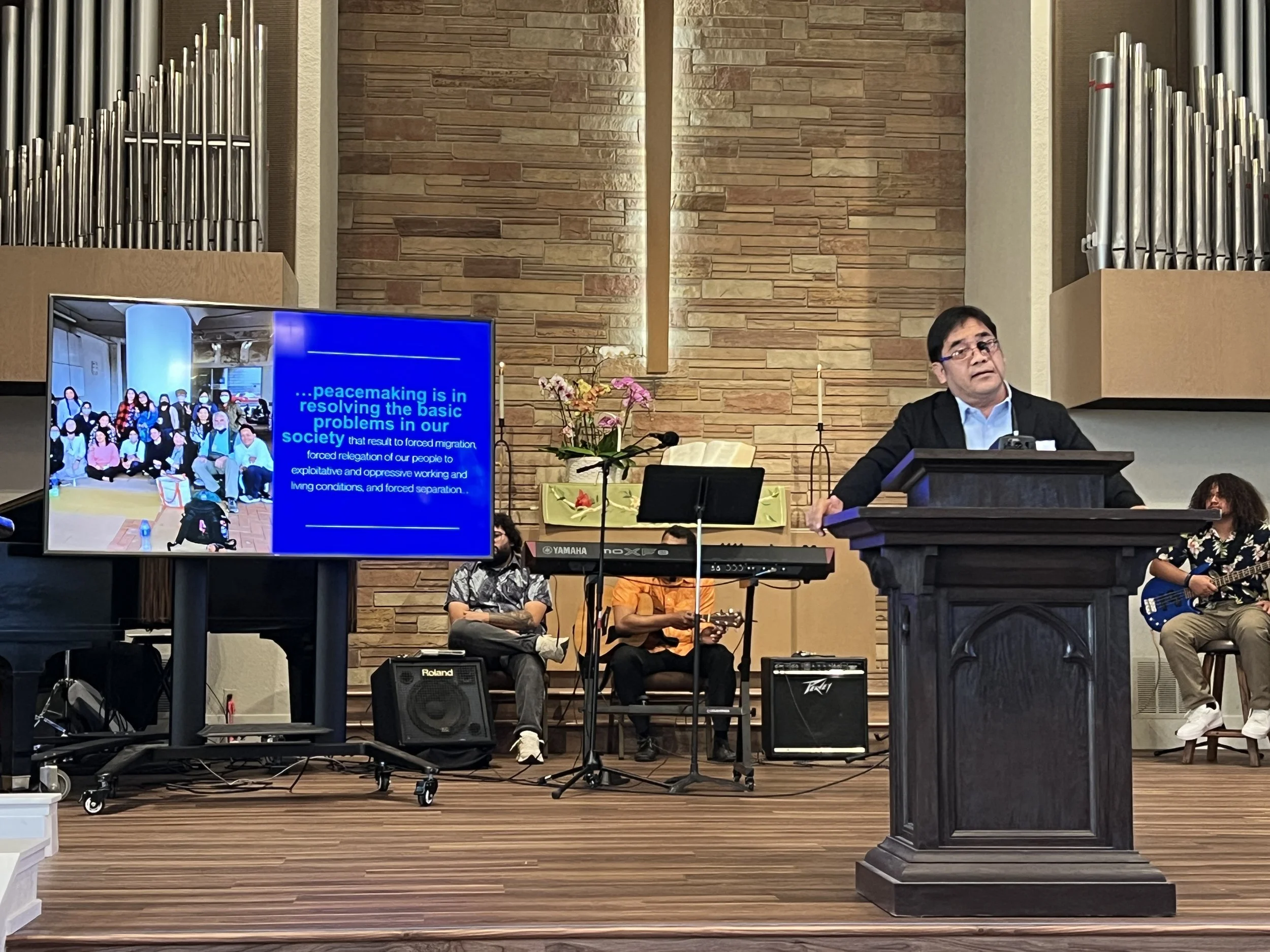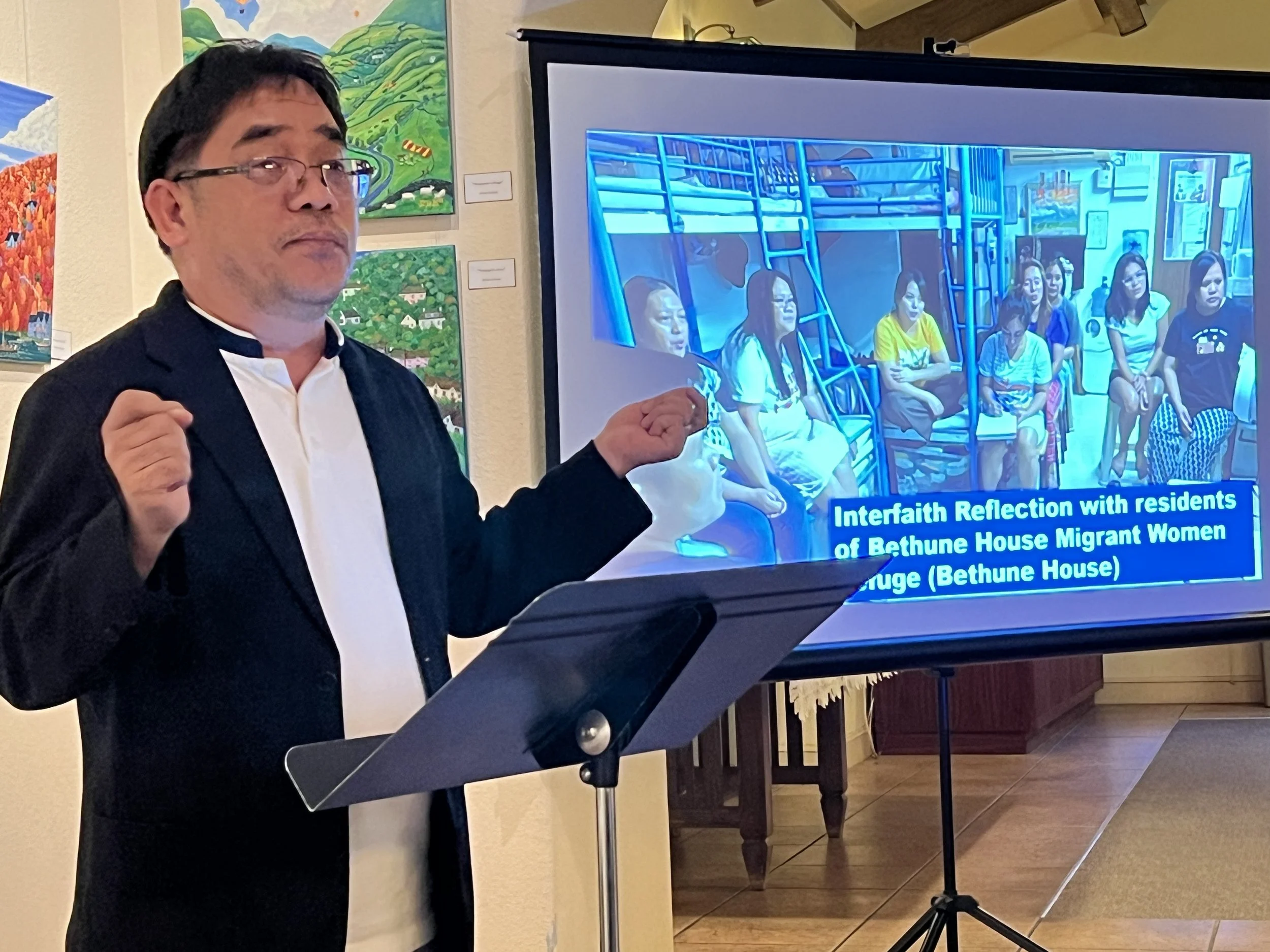APMM Joined the 2024 International Peacemakers: Educating and building partnership and cooperation with Presbyterian Churches in the USA







From 9 September to 9 October 2024, Rev. Joram H. Calimutan represented the Asia Pacific Mission for Migrants (APMM), United Church of Christ in the Philippines (UCCP), and the Asia Pacific Interfaith Network for the Rights of Migrants (AP INFORM) to the 2024 International Peacemakers, organized by the Presbyterian Church (USA) through its International Peacemaking Program. Rev. Joram, together with eight other peacemakers from Fiji, Costa Rica, Nigeria, Moldova, Palestine, South Korea, Puerto Rico, and New Mexico, USA were invited to offer hope in a hurting world. By sharing stories of their work and witness, the peacemakers help Presbyterian Churches to understand peace and justice concerns around the world and provide insights that can inspire the latter to greater faithfulness.
The peacemaking program enjoined the peacemakers to speaking tours and preaching requests during Presbyterian meetings, mid-council meetings, and Sunday worship services especially during the World Communion Sunday. These paved the way into discussions and sharing on social injustice, war and conflict, climate change, development aggression, forced migration, and human rights violations that have deeper connections to the US’ manifest destiny doctrine and intervention to economic, political and military affairs of many developing countries particularly in Asia Pacific region. They challenged Presbyterian Churches to be more engaging in peacemaking work and support various initiatives of partner churches and serving institutions outside of the US.
APMM’s continuing engagement with churches and ecumenical organizations
Under the theme, “Blossoming of Hope: Cooperation, Partnership and Solidarity, Realities of forced migration and the unwavering commitment for social justice, peace and human rights,” Rev. Joram preached and shared in Presbyterian Churches in Sacramento, Stockton, Montana and Cincinnati. In his presentation during the Mission Month celebrated in Westminster Presbyterian Church and Carmichael Presbyterian Church in Sacramento, as well as in Glacier Presbytery Meeting in Missoula City, he emphasized that peacemaking [in the context of forced migration in Asia Pacific and Middle East region] is in resolving the basic problems in our society that result to forced migration, forced relegation of our people to exploitative and oppressive working and living conditions, and forced separation from family, culture, social environment of countries of origin.
He shared that around 10% of the Philippine’s population are scattered around the globe and more than 6,000 Filipinos every day are leaving their families and country behind for work abroad. In the US there are around 4.1 million Filipino Americans comprising 17% of the Asian American population. Forced migration of Filipinos is a result of failed economic policies that perpetuate poverty, unemployment, low wages, and landlessness. It became more systematic through the Philippine government’s labour export policy (LEP) that treats Filipino migrants as mere milking cow and commodities for sale. In 2023 the Philippine government earned USD 37.3 billion from the remittances of Filipino migrants all over the world. High remittance levels contribute to the Philippine economy and at the same time, it helps in maintaining a good credit standing within the fiscal standards of financial institutions such as the IMF-World Bank. Looking at LEP structurally, its neoliberal core largely drives an economy that continues to be backward, export-oriented and import-dependent, and debt-driven.
Rev. Joram also shared about APMM’s work with and for migrants in Asia Pacific and the Middle East, citing how the organization works with different formations to address the root causes of poverty, unemployment, landlessness, and lack of economic opportunities for citizens. Involvement of churches in the Philippines, like the UCCP, in migration issues was also highlighted. They continuously uphold the image of God, by helping ordinary Filipinos whose rights are systematically and wantonly violated, despite risks of following Christ by serving the people. In fact, until today, the UCCP, together with the National Council of Churches in the Philippines (NCCP) and other Protestant Churches persistently call for the resumption of peacetalks between the Government of the Philippines and the National Democratic Front of the Philippines (NDFP) to address the root-causes of more than 50 years of armed conflict in the country.
Rev. Joram also delivered other sermons on the topic of “love that is empowering is compassionate and just” in other Presbyterian churches during his US visit. He discussed this in the context of serving and defending the rights and well-being of the most vulnerable sector of society like migrants, refugees and other displaced people in Asia Pacific and the Middle East. Rev. Joram particularly shared experiences from South Korea and Hong Kong, demonstrating the unwavering solidarity practiced by people of different faiths and societal backgrounds to help in restoring the human dignity of the marginalized. All of these, he emphasized, are rooted in Jesus’ examples of loving the poor, the deprived and the oppressed and of giving one’s life for the sake of others.
In concluding his sermon, Rev. Joram reiterated that “love that is empowering is compassionate and just” should be expressed by bearing witness to the suffering and struggle of people in communities. It is to stand firm for the people who need God the most despite the risk of following Jesus’ teachings and examples.
Establishing and strengthening APMM and PCUSA partnership and cooperation
Presbyterian Churches in the USA appreciated the sharing on the realities of forced migration in the Asia Pacific and Middle East. Many of them acknowledged that they do not know and understand the condition of migrants, refugees and other displaced people in said regions – particularly, the sacrifices of women migrants who are forced to leave their children and families behind just to send them to school and alleviate them from the shackles of poverty.
The month-long international peacemaking further strengthens the cooperation and partnership between APMM and PCUSA. It provided a venue for mutual education, exploring ways of cooperation and supporting each other’s programs and engagements. 2024 International Peacemakers brought the issues and concerns of the people in communities afflicted by neoliberal policies spearheaded by the US and brought churches into dialogue and consultation.
At the end of the month-long visit, both the Presbyterian Churches and 2024 International Peacemakers mutually understand the significance and relevance of peacemaking as a ministry and program as it responds to the concrete condition of people in the communities as the Gospel of Matthew utters, “Then the righteous will answer him, ‘Lord, when was it that we saw you hungry and gave you food or thirsty and gave you something to drink? And when was it that we saw you a stranger and welcomed you or naked and gave you clothing? And when was it that we saw you sick or in prison and visited you?’ And the king will answer them, ‘Truly I tell you, just as you did it to one of the least of these brothers and sisters of mine, you did it to me.” ###
